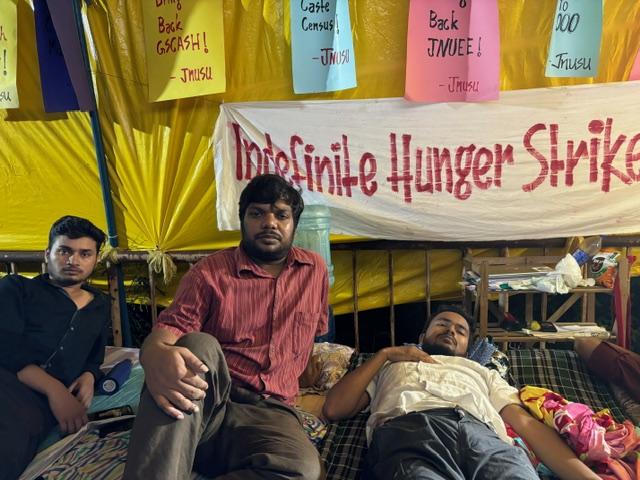Delhi: JNU Students’ Hunger Strike for Hostel, Scholarships Enters 10th Day

JNUSU president Dhananjay and other students on hunger strike, which entered the 10th day on August 21, 2024. Image credit: Ravi Kaushal
New Delhi: The students’ hunger strike at Jawaharlal Nehru University (JNU), the country’s premier research institution, entered the 10h day on Wednesday. The students are on a protest fast on the appeal of JNU Students’ Union (JNUSU) after a dialogue between the students’ representatives and the administration fell flat. The university officials, in the talks, expressed their inability in fulfilling the demands of increased merit-cum-means scholarships and opening of Barak hostel among others. Three students have been shifted to the All-India Institute of Medical Sciences (AIIMS), New Delhi, after their health deteriorated.
Space crunch for everyone
Gopika, who completed her masters in Sociology from the School of Social Sciences narrates her story to illustrate the immediate need of opening of the Barak Hostel. She said that the university claimed to be a completely residential campus and offered hostel facility from first day of admission. But the truth remains otherwise.
“I travelled from Thrissur in Kerala to secure my admission in the university. When I came here, we were provided accommodation in a dormitory by the students’ union. The administration officials said that the union had not sought permission to set up a dormitory and threatened to close the facility. After much negotiations, we were allowed to stay. We would go to the hostel messes for food and the managers would ask for our room numbers. Mind you, a student goes through this hassle every year despite being a bonafide student,” she said.
Gopika said some senior students share their rooms with juniors. It may take months to provide a room to a new student. “In these months, many students are forced to pay a hefty rent for cramped homes in Munirka. Our parents are particularly worried about our safety. In my case, my parents had to send additional money. It is a difficult time for us. My mother is a cancer survivor and my sister is also studying. I had secured admission in Tata Institute of Social Sciences (TISS) Pune, too. However, I chose JNU because it was affordable,” she said.
Students believe that the Barak Hostel, named after Barak River in the North-Eastern hills, would relieve the pressure arising out of residential space crunch in the university. Inaugurated in February this year by Union Minster of Home Affairs, Amit Shah, the new hostel can accommodate 446 students. However, there has been no clarification from the administration on the commencement of operations.
A decade’s wait
Joyeeta Biswas, a first-generation girl student from her family in Tahirpur town in Nadia district of West Bengal, told NewsClick that JNU provided a huge relief to students in terms of its fee structure. The students pay tuition fee of Rs 268 per semester and it remains the most inclusive campus of the country. However, students bear other expenses of food, travel, stationery and other expenses. The university’s means-cum-merit scholarship has not been revised in a decade.
“The food bill in hostels like Mahi Mandavi has crossed Rs 5,400 per month. Now many students do not ask their families who are struggling under poverty. The merit-cum-means scholarship remains steady at Rs 1,200. How do we keep up with soaring bills with this little help. It must be remembered that we do not receive scholarships monthly. It is disbursed at intermittent time intervals,” she added.
Biswas, a student at the School of Language, Literature and Culture Studies, like other students, believes that the amount of the scholarships must be increased. “We expect a lot from the university because it uplifted so many of us with dreams. It hurts when it fails us,” he said.
Avijit Ghosh, a student at Centre for Studies in Regional Development (CSRD), sitting near the protest site told NewsClick that much of the crisis in the university was rooted in fund cuts and HEFA loan taken the previous year. JNU received Rs 496 crore loan from Higher Education Funding Agency (HEFA) for development of 10 projects in 2023. HEFA is a joint venture of Canara Bank and Ministry of Education, especially set up for lending to education institutions.
“The situation is so bad that our library faced a fund cut up to 80%. Students cannot access basic journals. The centres are asking students to arrange their own funds for field trips. The number of international seminars has gone down too,” said Ghosh.
When asked for the way ahead for resolution of the crisis, Ghosh, also Vice President, JNUSU, said the Vice-Chancellor Santishree Dhulipudi Pandit, as the head of the institution, has the responsibility to ask the Union government for funds.
Dhananjay, president, JNU Students Union, who has been on fast for 10 days, said they were forced to take the Gandhian step after several talks with the administration failed. “We take inspiration from Bhagat Singh and Jatin Das who observed one of the longest hunger strikes in the world. I think it is a very powerful tool to press for our demands in a democracy. We are well aware that it may harm our health but the future of several generations is at stake. We cannot back down.”
“The fund crunch that university witnesses reminds us of several misadventures that the administration took in recent years. When JNU conducted its own entrance exam, it spent Rs 2.6 crore which it recovered from the sale of its prospectus and forms. However, it is giving Rs 9 crore to National Testing Agency for computer- based tests. When JNU conducted its own entrance exam, it assessed aspirants on their analytical skills even when he/she was writing paper in their vernacular languages. It was an inclusive exercise where students from marginalised communities and mofussil towns could come and study here. It is not possible now. The aspirants who do not know about computer applications are simply out of the race for no fault of theirs,” Dhananjay added.
When asked, the Vice Chancellor, told NewsClick, “The Ministry of Education totally subsidises JNU but JNU has no internal receipts of its own unlike other Central Universities who raise 20% to 30% from internal receipts. Over the years, students, teachers and staff have increased on campus. Students in JNU pay fee as low as Rs. 10 and Rs. 20 till date. The MoE, GoI has totally supported our spiralling demands by increasing funds but still we are unable to meet the ever-increasing costs related to infrastructure, books, online sources, software etc. required for research.”
Pandit added that “merit-cum-means scholarship given to JNU students, helps scores, which is also totally borne by the university. In such a scenario, one has to plan for the future. JNU needs to generate its own funds, increase receipts without raising fees. Hence some of these ideas include ways of public-private partnerships to run, revamp, reuse and optimize JNU assets which can help generate regular income for the university.”
Get the latest reports & analysis with people's perspective on Protests, movements & deep analytical videos, discussions of the current affairs in your Telegram app. Subscribe to NewsClick's Telegram channel & get Real-Time updates on stories, as they get published on our website.
























